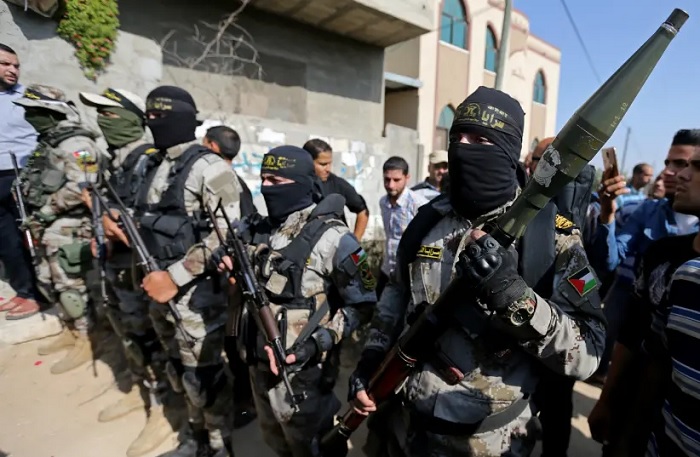
For almost a year, Palestinian Islamic Jihad was largely absent from Iran’s media and political push. Now, Iran is back, talking about it in the media a day after Ankara’s press highlighted the group. PIJ claimed it was “mobilizing” in Gaza over the weekend, so the articles do not appear to be a coincidence.
After conflict with Israel in 2019, PIJ suffered setbacks and was concerned about threats to its leadership. Baha Abu al-Ata had been killed in November by an Israeli airstrike, and Syrian reports said the home of deputy leader Akram al-Ajouri had been targeted.
Iran follows the group closely. PIJ is believed to be an Iranian proxy that has been armed, advised and given cash and technical assistance over the years by Tehran. It is Iran’s footprint in Gaza, and perhaps its eyes and ears as well.
The terrorist group also provides Iran leverage and options, including plausible deniability should Iran want to test Israel. That appears clear from how the group has offices in Gaza and Damascus, two key fronts for Tehran against Jerusalem.
Iranian Foreign Minister Javad Zarif is frequently in contact with Islamic Jihad. Last year, he called PIJ leader Ziyad al-Nakhalah to support its attacks on Israel. He spoke to the group or issued statements linked to it this February and July. Today, Iran is angry about the Israel-Sudan agreement and highlights Hamas opposition to the agreement.
In the past, Iran has sought to move weapons via Sudan. Hamas members once enjoyed more support from Sudan and its Muslim Brotherhood contact there. Ismail Haniyeh went to Sudan in 2012, according to reports. Today, he is very angry that Khartoum is talking to Israel. Iran is angry as well.
Islamic Jihad’s “military branch,” Saraya al-Quds, announced an alert and mobilization over the weekend, Iran’s Fars News Agency reported. Ostensibly, the reason for this was the deterioration in the health of Maher al-Akhras, who is on a hunger strike. Akhras, 49, is from the West Bank and has been on a hunger strike for three months.
“The military wing of the Islamic Jihad decided to be fully prepared on Saturday after announcing the deterioration of the situation of Maher al-Akhras,” Fars reported. “Akhras is one of the forces of Islamic Jihad who has been on a hunger strike for 90 days in protest of his detention in the Zionist regime’s prisons, and his condition is deteriorating.”
Israeli media often report that Akhras was detained because of “suspected ties with Islamic Jihad.”
FARS NEWS provided some other details, noting that according to Akhras’s lawyer, the hunger striker does not “want to die in the Zionist regime’s Kaplan Medical Center in Rehovot, saying that he did not want any help from the Zionists except to “transfer him to be in hospital in the West bank to be among his compatriots and children.”
According to Anadolu Agency, a state-run news agency in Turkey: “The Palestinian Prisoners Society (PPS) said on Friday that the Israeli authorities canceled freezing the detention of Palestinian detainee Akhras and transferred him to Ramallah Prison Hospital. According to the PSS, Akhras was “suddenly transferred from Kaplan Hospital to Ramallah Prison Hospital.”
He previously had instructed Palestinians to defend their homeland, Fars reported, quoting him as saying: “I also advise the Palestinian people to remain defenders of their homeland.”
The “mobilization” of Islamic Jihad’s fighters appears to be the second time in 48 hours the group has received front-page coverage in Turkey and Iran. That shows it is pushing for relevance again after a year in which it was relatively quiet after the November clashes with Israel. It is not clear if this is because Iran and Turkey want to highlight and use the group, or if it is at the group’s own initiative.
It is not as simple as just a cycle of escalation related to the hunger strike. The statement by PIJ in Turkey was about France, and another statement recently condemned the Israel-Sudan discussions. This illustrates that the group is seeking to push messages regionally and find an excuse locally to confront Israel.
 Eurasia Press & News
Eurasia Press & News

